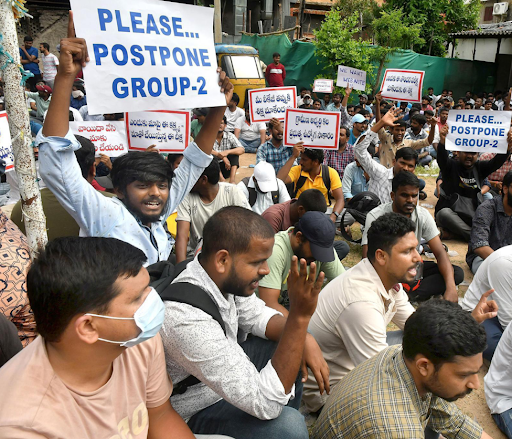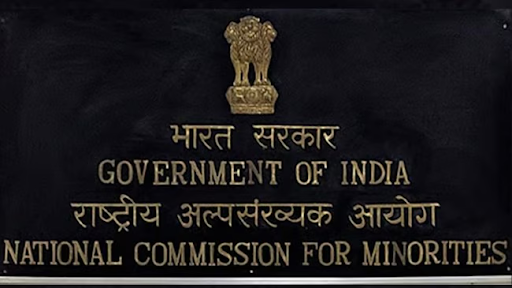



State Public Service Commissions need stronger autonomy through a collegium-style appointment involving the Chief Justice and Opposition Leader. A fixed exam calendar, secure digital systems and multi-stage evaluation can improve recruitment. A grievance tribunal and strict ethics code will rebuild trust and ensure fair, effective state administration.

Copyright infringement not intended
Picture Courtesy: THE HINDU
The Telangana State Public Service Commission (TSPSC) to host the national conference of chairpersons of State Public Service Commissions (PSCs) in December 2025.
They are independent constitutional bodies mandated to conduct recruitment for civil services, ensuring a merit-based selection process.
The upcoming national conference of State PSC chairpersons in December 2025 provides a crucial platform to address the systemic issues causing a severe ‘trust deficit’ among aspirants.
|
State PSCs frequently face controversies and litigation in recruitment processes, leading to delays and a "trust deficit" among aspirants due to systemic structural and procedural lapses. |
Origin in Freedom Struggle: The demand for Indians to enter civil services based on merit, not patronage, was a key component of the 'self-rule' movement.
Montagu-Chelmsford Report (1919): First official report to propose a permanent, politically insulated body to regulate service matters.
Lee Commission (1924): Recommended the establishment of a Public Service Commission, leading to the formation of the first PSC for the Union on October 1, 1926.
Government of India Act, 1935: Provided for the establishment of a Federal PSC and a Provincial PSC (PPSC) for each province.
Constitutional Status: The Constitution of India established the Union Public Service Commission (UPSC) and State Public Service Commissions (SPSCs) as autonomous bodies under Articles 315 to 323 in Part XIV.
|
Union Public Service Commission (UPSC) |
State Public Service Commissions (SPSCs) |
|
|
Level |
Central (Union) Government |
State Governments |
|
Jurisdiction |
All India Services (IAS, IPS, IFS, etc.) and various Central Civil Services (Group A & B) |
Various State Civil Services (e.g., State Administrative Service, State Police Service) |
|
Constitutional Basis |
Article 315 to 323, Part XIV of the Indian Constitution |
Article 315 to 323, Part XIV of the Indian Constitution |
|
Chairperson/Member Max. Age Limit |
65 years |
62 years |
|
Chairperson/Member Term Length |
6 years (or until max. age, whichever is earlier) |
6 years (or until max. age, whichever is earlier) |
|
Appointing Authority |
Members and Chairperson appointed by the President of India |
Members and Chairperson appointed by the Governor of the respective state |
|
Removal Authority |
Members and Chairperson can only be removed by the President of India (following a Supreme Court inquiry in cases of misbehaviour) |
Members and Chairperson can only be removed by the President of India (following a Supreme Court inquiry) |
|
Expenditure Source |
Charged upon the Consolidated Fund of India |
Charged upon the Consolidated Fund of the respective State |
|
Reporting Authority |
Submits an annual report to the President of India |
Submits an annual report to the Governor of the respective state |
Structural Flaws
Political Interference: The 'spoils system' in the appointment of members compromises the impartiality and integrity of the commissions.
Irregular Recruitment Cycle: Lack of systematic manpower planning and financial constraints in states lead to unpredictable examination schedules, causing distress to aspirants.
Complex Reservation Policies: Errors in applying complex vertical, horizontal, and zonal reservation quotas are a frequent source of litigation, derailing recruitment timelines.
Procedural Lapses & Corruption
Paper Leaks: The Indian Express 2024 report revealed at least 41 documented instances of leaks in recruitment exams across 15 states in the last five years, affecting 1.4 crore applicants.

Outdated Processes: Failure to periodically update the syllabus and evaluation methods to match contemporary needs and UPSC standards.
Lack of Transparency: Inefficient grievance redressal mechanisms force aspirants to seek judicial recourse, causing long delays.
Committee Established for Civil Service ReformFirst Administrative Reforms Commission (ARC): Established in 1966, this commission was initially chaired by Morarji Desai and later by K. Hanumanthaiah.
Kothari Committee: Constituted in 1976, this committee focused on recruitment policies.
Satish Chandra Committee appointed in 1989 to review the civil service examination system.
Sarkaria Commission established in 1983 to review Centre-State relations, its report also included recommendations on the All-India Services.
Hota Committee Constituted in 2004, this committee was dedicated to civil service reforms.
Second Administrative Reforms Commission (ARC): Established in 2005 under the chairmanship of Veerappa Moily, this commission produced 15 reports covering various aspects of public administration.
Baswan Committee was formed in 2015 to examine the scheme and pattern of the UPSC Civil Services Examination.
|
Manpower Planning: States should establish a dedicated Ministry of Personnel Management to create a five-year recruitment roadmap, to ensure regular vacancy notifications and a predictable schedule.
Specify Qualifications: Mandate specific qualifications: Secretary-level rank for official members and 10 years of practice in a recognized profession for non-official members. Aligns with Hota Committee (2004).
Political Neutrality: A mandatory consultation with the Leader of the Opposition for non-official appointments could help curb the 'spoils system'.
Syllabus Revision: The syllabus must be revised periodically in consultation with the public and aligned with the UPSC pattern.
Strengthen Secretariat: The Secretary of the State PSC should be a senior officer with relevant prior experience, such as Commissioner of School Education, to effectively manage the examination process.
Transparency/Confidentiality: A balance between transparency and confidentiality must be maintained, adopting the best practices of the UPSC to respond swiftly to lapses and reduce the need for judicial recourse.
Initiatives To Reform Its Civil ServicesMission Karmayogi: Shifts civil service training from rule-based to role-based learning through the Integrated Government Online Training (iGOT) platform. Lateral Entry Scheme: Introduced in 2018, to bring domain experts from the private sector and other institutions directly into mid- and senior-level government positions. 360-Degree Appraisal System: Performance review mechanism for senior bureaucrats. It includes confidential feedback from peers, subordinates, and external stakeholders, replacing the older Annual Confidential Report (ACR) system. Digital Governance Initiatives: The government has advanced e-governance to increase transparency and efficiency.
Recruitment reforms: The government has introduced a National Recruitment Agency (NRA) to conduct a common eligibility test for non-gazetted posts. Interviews for Group C and D posts have been discontinued to reduce bias.
|
State Public Service Commissions (SPSCs) are suffering a crisis of credibility due to structural flaws like politically influenced appointments and procedural deficiencies, requiring urgent, comprehensive reforms—including merit-based appointments and modernized examination processes—to restore public faith and align with their constitutional role as guardians of merit.
Source: THE HINDU
|
PRACTICE QUESTION Q. With reference to the historical evolution of Public Service Commissions in India, consider the following statements: 1. The Montagu-Chelmsford Report of 1919 first proposed the idea of a permanent office to oversee service matters, insulated from political influence. 2. The Government of India Act, 1935, provided for the establishment of a Public Service Commission at the Union level but not for the provinces. Which of the statements given above is/are correct? A) 1 only B) 2 only C) Both 1 and 2 D) Neither 1 nor 2 Answer: A Explanation: Statement 1 is correct: The Montagu-Chelmsford Report of 1918 (which led to the Government of India Act, 1919) proposed the idea of a permanent office to oversee service matters, insulated from political influence. This was reiterated and strongly recommended by the Lee Commission in 1924, which led to the establishment of the first Public Service Commission on October 1, 1926. Statement 2 is incorrect: The Government of India Act, 1935, provided for the establishment of not only a Federal Public Service Commission at the Union (federal) level but also a Provincial Public Service Commission (PPSC) for each province or a Joint Public Service Commission for two or more provinces. |
The Union Public Service Commission (UPSC) and State Public Service Commissions (SPSCs) are constitutional bodies established under Articles 315 to 323 in Part XIV of the Constitution of India. They are mandated to serve the recruitment needs of the Union and the States, respectively.
To make appointments more merit-based, it is suggested to amend the constitution to stipulate clear qualifications (e.g., experience as a Secretary for official members), fix a minimum appointment age of 55, and make consultation with the Leader of the Opposition mandatory for non-official appointments to curb political patronage.
Part XIV of the Indian Constitution, specifically Articles 315 to 323, outlines the establishment, appointment, functions, and powers of the Union Public Service Commission (UPSC) and the State Public Service Commissions (SPSCs).




© 2026 iasgyan. All right reserved